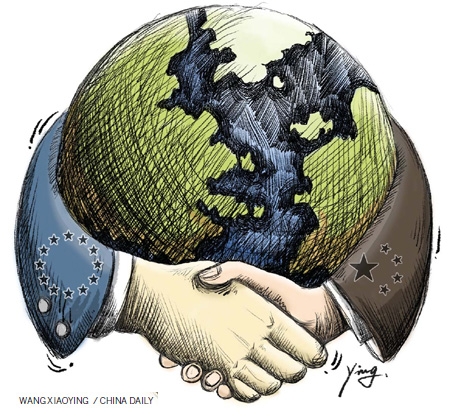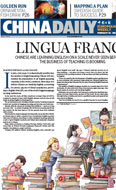Public perception key to good ties
Updated: 2011-02-18 10:27
By Wang Zhengxu (China Daily European Weekly)
Chinese have a more positive view of Europe than most other countries but closer interaction needed
 |
China and Europe enjoy some very favorable conditions for developing trust and cooperation. Chinese people view China-Europe relations much more favorably than their country's relations with the United States, Japan and many other countries.
In our study sponsored by the European Commission's Seventh Framework Programme (FP7), we found that the majority of Chinese citizens hold positive attitudes toward Europe, the European Union, and European people. And 74 percent of the respondents view the EU positively, while only 60 percent do so for the US, and 38 percent for Japan. Our survey included more than 3,000 randomly selected citizens living in six major cities in China. Among them, 78 percent hold a positive attitude towards residents of the EU.
Hence a high level of European amity exists in China. In Europe, while people may be concerned about the huge impact China has on the global environment and energy security, and are skeptical about China's political system and human rights, they are still interested in the rich culture and booming economy of China.
The two economies are highly complementary. The high-tech manufacturing industry of Europe can support and push the upgrading of China's industry, while China's low-cost manufacturing and expanding consumer market can be highly beneficial to Europe.
In recent months, China has signed many technology partnership agreements with the United Kingdom, Germany and France, which showcase the importance of advanced European technology in the low-carbon, high-efficient, and sustainable development of Chinese industries. Experts suggest that advanced practices on environment-friendly production in the automotive, architecture, new energy and new material sectors can be adopted by Chinese industries.
The major obstacles between China and Europe currently are the different cultures and ideologies. Studies in international communication reveal that religion, ideology and a history of conflict often play decisive roles in shaping people's perceptions of another country.
An individual is likely to develop fear or uncertainty if he or she thinks the other country belongs to a different cultural tradition, or has a very different political system. Hence, the rapid rise of China has trigged anxiety in some parts of the world, including Europe, partly because many Europeans often see the two as having very different ideologies, or political systems.
Some media outlets, activists, and opinion leaders in Europe often frame issues about China along ideological lines, a legacy of the Cold War.
The prejudiced view toward China's ideology has manifested itself among some Europeans in the form of such issues as the Nobel Peace Prize in 2010 and French protests against the Olympic torch relay in 2008. European people's mistrust of China, and their impatience regarding political reform and human rights in China, largely derive from the fact that they perceive China as belonging to a different ideology and having a different political system. This is called the act of "othering" in social theory. Once you believe an individual is an "other", it is hard to establish your trust in her or him. The same applies to nation-to-nation relations.
To eliminate misunderstanding between two nations, two kinds of cultures or two political communities, we have to enhance communication and cooperation, not only in business and trade, but also between governments, and in the fields of civil society, education, culture and entertainment.
In recent years, Chinese and European leaders have increased the frequency of exchange visits emphasizing communication and cooperation.
Our research shows that if an individual knows more about another country's internal complexities, such as its social fabric, he or she is more likely to view that country positively. That is, despite the two countries having different religions or cultural traditions, knowledge of the other can reduce suspicion and mistrust.
Studies have found, for example, Americans who know more about the internal diversities or complexities of a Middle Eastern country feel more positively about that country, even though, in general, Americans often distrust Islamic countries.
We also found Chinese people who know more about the internal complexities of Europe, such as understanding which countries use the euro and which do not, feel more positively about Europe, the EU's role in global affairs, and the EU-China relationship. They are also more likely to think of Europeans as trustworthy.
The more knowledge Chinese people have about the EU, the more positively they view EU citizens. Also, the more people receive positive information, the more they are in favor of the EU. Trust in other countries is also a significant factor; if people trust other countries in general, they will also have a more favorable view of Europeans.
Overall, in most of the cases, the amount of knowledge that Chinese people have, seems to affect their attitude about the EU. The more knowledgeable they are, the more positive attitude they have toward the EU and its citizens (including how trustworthy EU citizens are). The knowledge that Chinese people have about the EU, however, does not have an impact on their perception about the EU's role in the world and about the China-EU relationship. In addition, in all the analyses that were conducted, interest in different EU fields of knowledge like politics, economics, arts, sports or fashion has an impact on the dependent variables. In other words, the more interest Chinese people have in such fields, the more positively they will view the EU. The importance of an individual's knowledge in shaping his or her attitude about the EU is even more significant if we take into account that media exposure is already controlled in the model. In other words, even if a person receives a lot of negative information about the EU in the media, if he or she is aware of EU's internal complexities, he or she will still be in favor of the EU and its citizens.
Perception of another country or power plays an important role in the public's perceptions of foreign policy. If citizens perceive another power in a more positive light, they are more likely to give consent to policy options that bring their country closer to the power in question. Therefore, Chinese people's perceptions of the EU are an important part of public preferences for China's foreign policy. A positive attitude, which was noted as a result of the analyses conducted in this paper, is an indication of potential positive relations between China and the EU.
Hence, academic, educational, and cultural programs that promote the knowledge of one society in another help increase amity between the two.
The good news is that people to people diplomacy and public diplomacy are still in a nascent stage in China-Europe relations.
Exchanges and communication between scholars, writers and artists have been on the rise but they suffer from unidirectivity: Chinese scholars visiting Europe outnumber European scholars visiting China. In particular, scholars who have influence in mainstream intellectual circles seldom travel to China for exchanges, visits or teaching. And scholars who visit China are often Chinese experts and focus on Chinese issues in their academic life, and do not influence mainstream intellectual circles.
The psychological studies of cross-cultural communication show that the more you know about the complexity of a certain society, the less biased opinion you have about the society. Many people who have a prejudiced view of China change their attitude when they visit China.
People to people diplomacy and public diplomacy between China and Europe should lay a solid foundation for long-term mutually beneficial relations and push forward cooperation in business and trade, politics and national security.
The author is project coordinator of Chinese View of the EU, and acting director and senior research fellow of the China Policy Institute of the University of Nottingham.
E-paper

Online shops boom in China
Low investment, quick returns offer profit-making opportunities for struggling students.
Something 'fishy' about this trick
Banking on success
Branded outlets move in
Specials

The green lantern
Environmental concerns are shedding new light on a colorful tradition

Inland interchange
Chongqing bets on its position as a hub for China's west.

Zooming in on Chinese skies
Helicopter companies ride on country's growing interest in luxury aviation.
